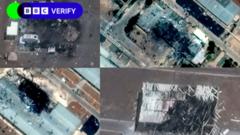Despite recent tensions, Iran's leadership expresses willingness for talks on nuclear arms, signaling a complex backdrop for potential diplomatic avenues.
Diplomacy Uncertain Amid Israeli-Iranian Conflict

Diplomacy Uncertain Amid Israeli-Iranian Conflict
As violence escalates between Israel and Iran, the path to renewed nuclear negotiations remains fraught yet possible.
June 15, 2025, 7:36 a.m. ET – In the ongoing conflict between Israel and Iran, where military actions may trigger prolonged strife, the prospect for restoring diplomacy regarding Iran's nuclear ambitions remains undeniable. Prime Minister Benjamin Netanyahu of Israel asserts that military strikes against Iran are pre-emptive measures aimed at halting Tehran's nuclear weapon aspirations, coinciding with the backdrop of stalled negotiations between the U.S. and Iran.
Iran's Foreign Minister, Abbas Araghchi, expressed readiness to engage in dialogue concerning nuclear arms, emphasizing that the nation would only accept agreements that maintain its entitlements to enrich uranium for peaceful purposes. He firmly stated, “We are prepared for any agreement aimed at ensuring Iran does not pursue nuclear weapons.” Nevertheless, he highlighted Iran's unwillingness to accept terms that would strip it of its rights, particularly the controversial enrichment process.
Furthermore, Araghchi described Israel's attacks as an intentional effort to disrupt ongoing dialogues rather than genuine pre-emptive defense against a nuclear threat, aligning with perspectives of numerous Western analysts. He contended, “It is entirely clear that the Israeli regime does not want any agreement on the nuclear issue; it does not want negotiations and does not seek diplomacy.”
While Netanyahu views any compromise that permits Iran the right to enrich uranium as a potential pathway to a nuclear-armed nation, President Trump maintains that the strikes could prompt Iran to return to diplomatic negotiations, albeit from a position of perceived weakness.
Experts suggest that a rapid resolution that involves relinquishing enrichment rights would be interpreted as a capitulation by the Iranian regime, thereby risking further domestic instability. Vali Nasr, an academic from Johns Hopkins University and former State Department official, remarked that “they won’t give up enrichment, not this easily.”
In this precarious scenario, as each party navigates complex geopolitical interests, the possibility of resumed negotiations on nuclear policy continues to hang in a delicate balance.





















